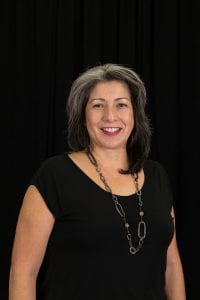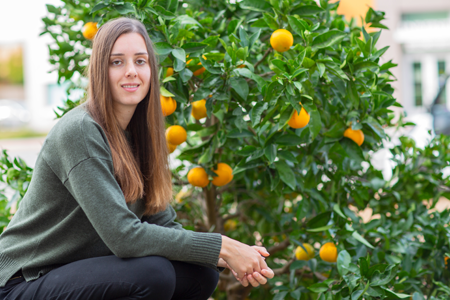 DR. PATRICIA L. PRADOOLMOS
DR. PATRICIA L. PRADOOLMOS
VICE PRESIDENT OF COMMUNITY ENGAGEMENT
CALIFORNIA STATE UNIVERSITY SAN MARCOS
April Dawson came to Cal State San Marcos to study biotechnology. She left with a mission — and a viable method — to help feed the world.
After earning a bachelor’s degree in biology from Idaho State University, Dawson saw the Master of Biotechnology: Professional Science Master’s at CSUSM as a solid next step that would offer a number of career choices when she graduated. As it turns out, she only needed one.
Key to the MBt program is a semester-in-residence in which students work on a research project with a sponsoring organization. Dawson teamed up with Local Urban Vegetables (LUV), an automated vertical farming start-up based in Whittier.
With the world’s population expected to increase from 7.7 billion to 9.7 billion by 2050, experts project that food production needs will stress global resources such as arable land and agricultural water used in traditional farming. By contrast, vertical farming is a sustainable, climate-controlled method that produces crops indoors in vertically stacked layers with no soil. Aeroponic technology, or misting the roots of plants, uses 95 to 99 percent less water than conventional agriculture.
Because vertical farming is expensive, however, innovation is needed to either reduce costs or increase revenue, Dawson says. That’s where her research comes in. Dawson’s project at LUV Produce was to test ways to treat spinach seeds — known for slow growth and long germination—to speed up their growth cycle.
“If you can make the plants grow faster, you can reduce your costs for growing the plants and you can get more crops over the course of a year,” Dawson said.
Using a method called priming the seeds, Dawson applied treatments to the spinach seeds before they were planted. While some researchers use one or two priming methods, Dawson tested and layered four priming methods as she studied varied concentrations and treatment times.
“The final treatment integrated all four priming methods into just two steps and reduced the time to germinate for spinach from 10 days to three days and produced a larger and more even harvest,” she told an audience of scientists during a presentation at the annual meeting of the National Professional Science Master’s Association. “When we stacked the priming methods on top of each other, they weren’t just additive, they were synergistic.”
The staff at LUV Produce was impressed with Dawson’s results and wanted to expand the research, so she received an immediate job offer as a research associate.
Dawson’s interest in science follows a family tradition, with her dad an electrical engineer in atmospheric research and a brother who works in science at Lockheed Martin. A perpetual family garden introduced Dawson at an early age to plants and the idea of food security. With family conversations often revolving around topics like climate change, plastic pollution, nature, wildlife and stars, Dawson inevitably developed an understanding of and a love for science.
“In today’s world, where we have all of this technology, people shouldn’t have to worry about having access to nutritious food,” Dawson said. “Ideally, my impact will be to help make food available to everybody as a human right.”
Dawson’s work is just one example of the innovative and socially just research being undertaken by CSUSM students. This year saw the opening of the CSUSM Innovation Hub, a space on campus that will help address societal needs through innovative practices and partnerships situated at the intersection of diversity, inclusion and student success.
